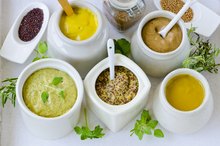What does fact checked mean?
At Healthfully, we strive to deliver objective content that is accurate and up-to-date. Our team periodically reviews articles in order to ensure content quality. The sources cited below consist of evidence from peer-reviewed journals, prominent medical organizations, academic associations, and government data.
The information contained on this site is for informational purposes only, and should not be used as a substitute for the advice of a professional health care provider. Please check with the appropriate physician regarding health questions and concerns. Although we strive to deliver accurate and up-to-date information, no guarantee to that effect is made.
Spaghetti & Cholesterol
Pasta and spaghetti sauce can be nutritious additions to your diet because the sauce is made with tomatoes. These foods are meat-free, which means they're also cholesterol-free. Add meatballs or other types of meat, however, and the nutrition information changes. Meat contains cholesterol, just like any other animal food, so if you're watching your intake of cholesterol, it's wise to reconsider whether the addition of meat is worth it.
Cholesterol 101
Many people tend to worry about their cholesterol levels, which is smart because limiting your intake of cholesterol is one way to help protect your heart. Some cholesterol, however, is necessary for the proper function of your body. Good cholesterol, also called high-density lipoprotein, can actually help remove bad cholesterol from your body.
Cholesterol-Free Spaghetti
Does Pasta Raise Your Cholesterol?
Learn More
A cup of cooked spaghetti noodles doesn't contain any cholesterol. That doesn't mean, however, that you're home free when you eat pasta noodles. According to 2010 article published in the "American Journal of Clinical Nutrition," a diet high in refined carbohydrates, such as white pasta, can contribute to weight gain, which can negatively affect your cholesterol level. If you opt for whole-wheat spaghetti, the meal doesn't have the same negative effects because it's higher in fiber, a nutrient that can help lower your overall cholesterol levels.
- A cup of cooked spaghetti noodles doesn't contain any cholesterol.
- According to 2010 article published in the "American Journal of Clinical Nutrition," a diet high in refined carbohydrates, such as white pasta, can contribute to weight gain, which can negatively affect your cholesterol level.
Cholesterol-Adding Ingredients
Any type of meat adds cholesterol to your spaghetti. A 100-gram serving of Italian sausage, which is about 3.5 ounces, for example, contains 57 milligrams of cholesterol. More concerning than the actual cholesterol is the amount of saturated fat certain types of meat can add to your pasta meal. A 3.5-ounce portion of Italian sausage contains 9.6 grams of saturated fat. Topping your spaghetti with cheese adds more cholesterol and saturated fat. An ounce of Parmesan cheese, for example, has 25 milligrams of cholesterol and 4.9 grams of saturated fat.
- Any type of meat adds cholesterol to your spaghetti.
- An ounce of Parmesan cheese, for example, has 25 milligrams of cholesterol and 4.9 grams of saturated fat.
Making the Best Spaghetti for You
What Thai Food Is Low in Cholesterol?
Learn More
Add vegetables to your spaghetti because they are rich in fiber and vitamin C but also because a diet high in veggies can help reduce your overall cholesterol level. Bell peppers, zucchini, shredded broccoli or spinach are a few ideas that pair well with the flavors of spaghetti sauce. If you want a meat sauce, opt for reduced-fat or lean meats such as turkey sausage. Reduce the cholesterol and saturated fat content even more by limiting the amount of cheese you use or by choosing a low-fat version of your favorite cheese.
- Add vegetables to your spaghetti because they are rich in fiber and vitamin C but also because a diet high in veggies can help reduce your overall cholesterol level.
- Reduce the cholesterol and saturated fat content even more by limiting the amount of cheese you use or by choosing a low-fat version of your favorite cheese.
Related Articles
References
- USDA National Nutrient Database: Spaghetti, Cooked, Enriched, Without Added Salt
- USDA National Nutrient Database: Sausage, Italian, Pork, Cooked
- Harvard School of Public Health: Fats and Cholesterol: Out With the Bad, in With the Good
- University of Maryland Medical Center: Cholesterol
- USDA National Nutrient Database: Cheese, Parmesan, Grated
- American Heart Association. What is cholesterol?
- Cleveland Clinic. Cholesterol: What you need to know about high blood cholesterol. May 1, 2019.
- National Center for Health Statistics. Total and high-density lipoprotein cholesterol in adults: United States, 2015–2016. October 2017.
- Centers for Disease Control and Prevention. Cholesterol.
- Barter PJ. The causes and consequences of low levels of high density lipoproteins in patients with diabetes. Diabetes Metab J. 2011;35(2):101-106. doi:10.4093/dmj.2011.35.2.101
- American Heart Association. How to get your cholesterol tested.
- Keene D, Price C, Shun-shin MJ, Francis DP. Effect on cardiovascular risk of high density lipoprotein targeted drug treatments niacin, fibrates, and CETP inhibitors: meta-analysis of randomised controlled trials including 117,411 patients. BMJ. 2014;349:g4379. doi:10.1136/bmj.g4379
- Tall HR, Rader DJ. Trials and tribulations of CETP inhibitors. Circulation Research. Oct. 10, 2017.
- U.S. Food and Drug Administration. Cholesterol: Medicines to help you.
Writer Bio
Sara Ipatenco has taught writing, health and nutrition. She started writing in 2007 and has been published in Teaching Tolerance magazine. Ipatenco holds a bachelor's degree and a master's degree in education, both from the University of Denver.









